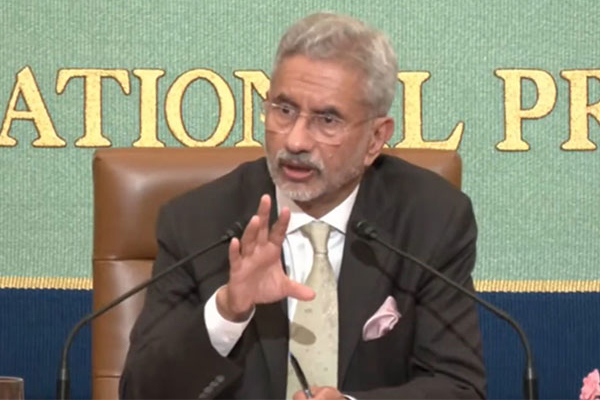 Agencies Agencies
TOKYO, July 29: Pointing towards the bilateral ties between India and China, External Affairs Minister S Jaishankar asserted that New Delhi's relations with Beijing are "not doing very well," and underlined how the relationship is not normal.
Speaking to the press in Tokyo, Jaishankar said, "We have views on China based on our experience. Our relations with China are not doing very well, the main reason for that is in 2020, during the COVID, China brought very large forces to the border areas between India and China in violation of agreements that we had with China and that created tensions which led to a clash, people died on both sides."
Notably, in 2020, the Indian and Chinese troops clashed at Galwan, the same year the pandemic started.
Noting that the issue has not been fully resolved yet between the two nations, the EAM remarked, "The consequences of that continue as the issue has not been fully resolved. The relationship right now with China is not good, not normal."
"As a neighbour, we hope for a better relationship, but that can only happen if they respect the LOC and respect agreements which they have signed in the past…" he said during the address.
Earlier today, India, Australia, Japan and the US, in their joint statement said they intend to launch a "Quad maritime legal dialogue" under the Quad Maritime Security Working Group to "focus expertise on international law of the sea issues in support of our efforts to uphold the rules-based maritime order in the Indo-Pacific."
The statement said that they contribute to a region in which all countries and people can exercise free choice on how they cooperate, and trade based on partnership, equality and mutual respect.
The Quad Foreign Ministers Meeting joint statement issued on July 29 said that the countries of the bloc were collectively advancing a positive and practical agenda to support the Indo-Pacific region's sustainable development, stability, and prosperity, responding to the region's needs.
Through Quad, the countries are supporting the region through practical cooperation on challenges such as maritime security, critical and emerging technologies, cyber security, humanitarian assistance and disaster relief, health security, climate change, counterterrorism, infrastructure and connectivity, and addressing the debt crisis through sustainable, transparent and fair lending and financing practices.
The countries will cooperate with regional partners to address shared challenges in the region, the statement read.
The joint statement also said that the Quad countries reaffirm their conviction that international law, including respect for sovereignty and territorial integrity, and the maintenance of peace, safety, security and stability in the maritime domain underpin the development and prosperity of the Indo-Pacific.
They pledged adherence to international law, particularly as reflected in the United Nations Convention on the Law of the Sea (UNCLOS), to address challenges to the global maritime rules-based order, including with respect to maritime claims, and in the South and East China Seas.
The countries affirmed that maritime disputes must be resolved peacefully and in accordance with international law, as reflected in the United Nations Convention on the Law of the Sea (UNCLOS).
The countries emphasized the importance of maintaining and upholding freedom of navigation and overflight, other lawful uses of sea, and unimpeded commerce consistent with international law. They also emphasized the universal and unified character of UNCLOS and reaffirmed that UNCLOS sets out the legal framework within which all activities in the oceans and the seas must be carried out.
Since May 2020, when the Chinese troops tried to aggressively change the status quo on LAC in eastern Ladakh, both sides have been deployed in forward positions near Patrolling Point 15, which emerged as a friction point in the wake of the Galwan clash.
Over 50,000 Indian soldiers have been stationed since 2020 at forward posts along the LAC, with advanced weapons to prevent any attempts to change the status quo unilaterally on the LAC. |
